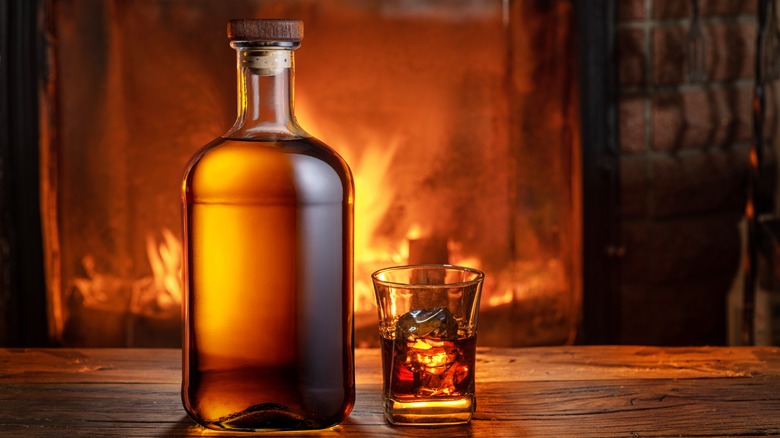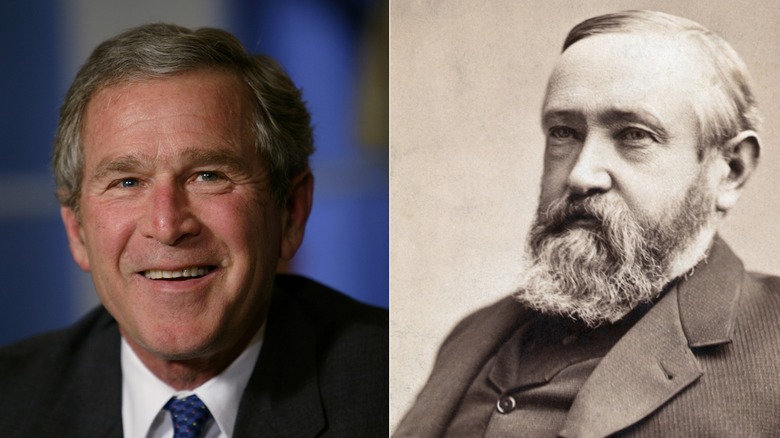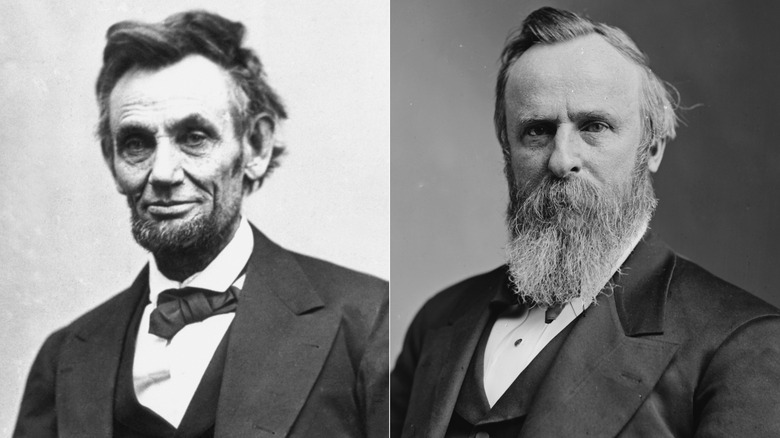All The Presidents Who Allegedly Never Drank Alcohol
Since George Washington, U.S. presidents have enjoyed a boozy nip or two. Presidents Franklin Pierce, Martin Van Buren, and Richard Nixon had reputations as hard drinkers, but most presidents preferred wine, beer, or champagne over the hard stuff. However, there were a few who didn't drink at all.
For all their differences, Joe Biden and Donald Trump share sobriety in common, and their aversion to alcohol stems from family tragedy. As is well-known, Biden was raised in Scranton, Pennsylvania, and when his father suffered misfortune in business, the family moved in with Biden's mother's parents, the Finnegans. Biden maintains that the Finnegans and their neighborhood were plagued by alcoholism, and he was particularly affected by his uncle Edward's and brother Frankie's struggles with drinking. He came to understand that alcohol would curtail his path to the presidency and thus never drank. As his son Hunter still deals with addiction, Biden believes that alcoholism is likely genetic.
Trump's disdain for alcohol is, like Biden's, deeply rooted in his family's past. His elder brother, Fred Jr., died at 42 from a heart attack caused by alcoholism, and in 2017, he spoke passionately about Fred's addiction. According to Trump, Fred warned him repeatedly not to drink, and seeing his brother's difficult life and failed attempts at rehabilitation, he took his advice. Fearful that he could be genetically predisposed to alcoholism, he made the same choice as Biden did, and never touched alcohol.
George W. Bush and Benjamin Harrison also abstained from alcohol
George W. Bush couldn't have been more dissimilar to Joe Biden and Donald Trump. A self-proclaimed epic drinker, Bush had been a party animal, chugging down beer, bourbon, and B&B. But in 1986, after a night of carousing to celebrate his 40th birthday, he awoke with a massive hangover and quit drinking cold turkey. It was rumored that he quit because Laura Bush had given him the ultimatum, "It's either Jim Beam or me," which she denied ever saying. Bush did acknowledge in his memoir that Laura initially doubted he could quit, but seeing how he struggled for sobriety, she encouraged and supported him.
In 2001, when Bush was president, twin daughters Jenna and Barbara had run-ins with the law for underage drinking and false identification for purchasing liquor. He found the occasion a few years later to warn them to watch out for overdrinking because he believed it ran in the family.
The only other confirmed presidential teetotaler was Benjamin Harrison (1889-1893), who no one could ever accuse of being a wild and crazy guy. Deeply religious, Harrison invoked God in his speeches, and daily prayer in the White House was the norm. He showed little passion for much else and was apparently so cold to people that his staff called him "the human iceberg." White House events were dreary booze-less affairs. Harrison likely kept to tea, 'while it was Mrs. Harrison's "homy custom" to serve guests hot clear soup instead of alcohol.
The Presidents who were partial teetotalers
In the 19th century, the Temperance Movement resulted in alcohol being banned from the White House and fought to prohibit booze nationally, and as seen a few times, its followers had the power to make or break a candidate. When running for president in 1860, Abraham Lincoln needed to appease the movement but not alienate drinking voters. "Honest Abe" never cared for alcohol, claiming that it made him feel "flabby and undone," and he convinced the movement that he supported their mission and was elected president. Lincoln was not a teetotaler, however, and sipped wine or champagne at White House functions to be polite. But he reportedly abstained from alcohol at private dinners, drinking only water or milk.
Rutherford B. Hayes (1877-1881) also used the Temperance Movement for political advantage. Hayes was not a teetotaler, but his wife, Lucy, was a fierce champion of the Movement. Realizing the popularity of the crusade, he banned alcohol from the White House. Critics blamed "Lemonade Lucy" for the policy, but Mrs. Hayes was widely admired, and her husband supported her convictions. Despite the no-booze rule, the Hayes' White House was known for its lively parties, filled with music and song.
President James K. Polk (1845-1849) admired whiskey-loving Andrew Jackson, but he didn't share the same taste for alcohol and was not known to be a heavy drinker. Like Hayes, Polk had an influential and strong-minded wife, who was also a popular hostess. A devout Presbyterian, Sarah Polk forbade alcohol and dancing at her weekly White House receptions. Her husband followed suit, and no alcohol was served during his presidency.


